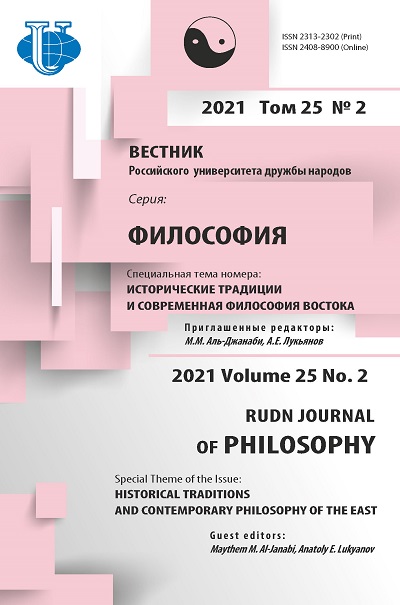Confucian Family Education and Ideological Tradition «Tian Di Jun Qin Shi»
- Authors: Zhao X.1
-
Affiliations:
- Sichuan University
- Issue: Vol 25, No 2 (2021): HISTORICAL TRADITIONS AND CONTEMPORARY PHILOSOPHY OF THE EAST
- Pages: 311-319
- Section: HISTORICAL TRADITIONS AND CONTEMPORARY PHILOSOPHY OF THE EAST
- URL: https://journals.rudn.ru/philosophy/article/view/26673
- DOI: https://doi.org/10.22363/2313-2302-2021-25-2-311-319
Cite item
Full Text
Abstract
This article will briefly describe the features, methods, goals of family education in ancient China, as well as the relevant educational roles of the father and mother in the family. The article will also analyze one of the most unique characteristics of ancient Chinese family education: in each family fixed a tablet with the words «天地君亲» «Tian Di Jun Qin Shi» (Heaven, land, rulers, ancestors, sages). In ancient China, people believed that teachers and relatives, and heaven, earth, and monarchs, were objects that people should respect and worship. Obviously, this clearly differs from the traditions of most other countries. The idea of «Tian Di Jun Qin Shi» first appeared in «Guo Yu» (国语), and in «Xunzi» (荀子) you can see the initial form of this thought. Over the next 2000 years, these five words penetrate deeply into people's minds, and people often mention them in their daily lives. Their importance and value in Chinese culture and Chinese life are very important and indispensable. The role played by the idea of «Tian Di Jun Qin Shi» in ancient Chinese family education is more effective than any classical legal practice.
About the authors
Xinzhu Zhao
Sichuan University
Author for correspondence.
Email: 751103939@qq.com
- Ph.D. of Philosophy
17, People's South Road, Chengdu, 610041, People's Republic of ChinaReferences
- Mengzi. URL: https://ctext.org/mengzi [Accessed 25th November 2020]. (In Chinese).
- Shiji. URL: https://ctext.org/shiji [Accessed 25th November 2020]. (In Chinese).
- Lun yu. URL: https://ctext.org/analects [Accessed 25th November 2020]. (In Chinese).
- Bai Hu Tong. URL: https://ctext.org/bai-hu-tong [Accessed 25th November 2020]. (In Chinese).
- Liu Xiang. Gu lie nu zhuan. URL: http://www.360doc.com/content/15/0805/13/52920_ 489643337.shtml [Accessed 25th November 2020]. (In Chinese).
- Chen Tongsheng. Go yu. V. 1. Beijing: Zhonghua chubanshe; 2014. (In Chinese).
- Lou Yule. Xunzi zhushi. Beijing: Zhonghua chubanshe; 2018. (In Chinese).
- Xun Kuang quanyi. Jiang Nanhua, Luo Shuqin, Yang Hanqing yi. Guilin: Guizhou renmin chubanshe; 2009. (In Chinese).
















